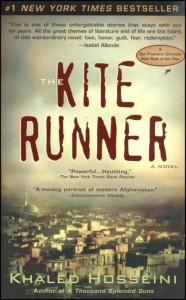 CBLDF this week joined a coalition of free-speech organizations objecting to the abrupt removal of Khaled Hosseini’s The Kite Runner from the curriculum of Higley Unified School District in Gilbert, Arizona. Although students in Honors English 10 have read the book for several years, administrators allege that it was never officially approved for use.
CBLDF this week joined a coalition of free-speech organizations objecting to the abrupt removal of Khaled Hosseini’s The Kite Runner from the curriculum of Higley Unified School District in Gilbert, Arizona. Although students in Honors English 10 have read the book for several years, administrators allege that it was never officially approved for use.
CBLDF joins coalition efforts like these to protect the freedom to read comics. Censorship manifests in many ways, and the unique visual nature of comics makes them more prone to censorship than other types of books. Taking an active stand against all instances of censorship curbs precedent that could adversely affect the rights upon which comics readers depend.
The story of the book’s removal was broken by a student-run news website called News From the Nation, which reported that English teachers received an email from the district’s Director of Secondary Education late in the afternoon of March 27, “informing them that The Kite Runner was no longer to be used as required reading, nor as an option for an independent reading novel.” With the fourth quarter of the school year starting the following day, teachers had to act fast and modify their lesson plans to cover the replacement title, John Steinbeck’s Of Mice and Men — which News of the Nation rightly points out is also a frequently challenged book due to profanity and racial slurs.
The following day, HUSD issued a statement claiming that it “does not ban books” but “makes every effort to select books in classes that reflect community standards.” The letter that CBLDF and other members of NCAC’s Kids’ Right to Read Project sent to Superintendent Mike Thomason pointed out that this criterion is entirely subjective and has no legal definition outside of obscenity law. As a result, “community standards” could be used to suppress all manner of classroom materials, the letter warned:
For instance, a religious group can claim that books with LGBT characters violate community standards and a politically motivated group may object to history material highlighting anything from labor struggles to slavery. Because today’s communities are so pluralistic and diverse, many works are likely to provoke disagreement and claims that they violate community standards. This could lead to numerous frivolous challenges to curricular materials.
Finally, NCAC also offered to help HUSD draw up a solid policy to address challenges to materials, which it currently lacks. The existing policy allows for the superintendent to unilaterally pull a book from use as soon as a complaint is received. If the complainant is unsatisfied with the initial decision, they may appeal it to the school board — which may then refer the matter back to the superintendent. NCAC urged the district to instead implement a reconsideration process supported by a committee including teachers and librarians, which would bring it in line with most other school systems in the country.
Check out the full letter sent to Superintendent Thomason below.
HigleyLetterNCAC-1 by betsy.gomez on Scribd
Help support CBLDF’s important First Amendment work in 2017 by visiting the Rewards Zone, making a donation, or becoming a member of CBLDF!
Contributing Editor Maren Williams is a reference librarian who enjoys free speech and rescue dogs.